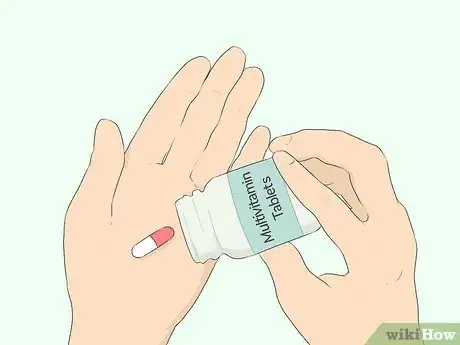This article was co-authored by Michael Stern. Michael Stern is a life coach and the owner of Integral Alignment, a coaching and training business focused on a holistic approach to optimizing one's health, work, love, play, and spirituality. Michael began his professional training in 2011 as an Integral Spiritual Mentor through One Spirit Learning Alliance, and has been certified as both a hatha yoga instructor and an Emotional Intelligence Coach through GolemanEI. In addition to his private 1:1 and groupwork, he has hosted workshops with thought leaders such as Frederic Laloux, Charles Eisenstein, and Thomas Hübl. Michael holds a BA in Spanish Language from Vanderbilt University and lives in Portland, Maine.
There are 8 references cited in this article, which can be found at the bottom of the page.
This article has been viewed 146,199 times.
Your mind is a powerful tool. However, many of us have busy schedules and lack sleep, making it difficult for our minds to perform at their best. You can improve your mental clarity through physical measures like sleep and diet as well as mental exercises, puzzles, and meditation.
Steps
Staying Rested and Healthy
-
1Attain a good quality and quantity of sleep. The National Sleep Foundation recommends seven to nine hours of sleep per night for optimal health and performance.[1] Most people fall short of this due to a hectic schedule or an inability to fall asleep. During sleep, memories and information are being processed and organized in your brain, so it’s essential you get enough of it to achieve clarity.[2]
-
2Get regular exercise. Try light aerobic exercise, such as brisk walking, swimming or casual cycling to increase the circulation of oxygen and glucose. Exercise helps your body work better, and that includes your brain. If you’re feeling mentally stuck, a walk outside will often help free your mind to work in a different direction.[3]Advertisement
-
3Maintain a healthy diet. Keeping your body working well is essential to mental clarity. If you’re feeling physically good, your mind is free to work.[4] Consume well-balanced, low-sugar and portion-controlled meals every four to five hours throughout the day.
-
4Eat foods that can help mental clarity. Scientists have begun researching food and its relationship to cognitive functions, and have some suggestions for your diet. Keep in mind that most of these are also just naturally healthy foods that are good to eat in general.[5]
- Chocolate
- Vegetables including cauliflower, chili peppers, sweet potatoes, beet juice
- Cantaloupe
- Sunflower seeds
- Rice bran, fortified breakfast cereals
- Yogurt
-
5Provide the right nutrients. When it comes to your brain, not all food is created equal. Your brain requires special nutrition for optimal performance.[6]
- Include polyunsaturated and omega-3 fats in your diet. Avoid saturated, trans and hydrogenated fats as these may actually have a negative impact on mental clarity.
- Take vitamins and minerals, such as Vitamin C, Vitamin E, B vitamins (especially B12), magnesium and zinc. These play an integral role in energy production, cell protection and the overall health of your organs. They are involved with the nervous and immune systems.
- Make sure to get certain amino acids, such as taurine and tyrosine, which play an important role in neurotransmission. They can be quickly depleted in times of stress, fatigue, sleep deprivation, exhaustion or with a sub-optimal diet.
- Try plant and herbal extracts, such as bacopa monnieri, rhodiola rosea, ginkgo biloba and huperzia serrata. These rejuvenate the nervous system and protect against neurodegeneration. They’ll help you to feel more alert by optimizing neurotransmission.
-
6Avoid alcohol. Even though at times alcohol may feel like it helps you focus, in the end alcohol makes your brain fuzzy. Alcohol in excess also interferes with the proper functioning of your body, making it difficult for your mind to achieve clarity.
-
7Reduce stress. For most of us, stress is the main reason we cannot focus as we want to. Think about stressors in your life and whether you can do anything about them.
- Do not seek out situations you know will be stressful.
- Avoid people who create stress in your life.
- Try to slow down. Think about carpooling or taking public transportation if you feel like you spend your life driving.
- Don’t overextend yourself. Know your limits and don’t volunteer for too much at work or in your personal life.
Improving your Mind
-
1Avoid distractions. Sometimes this is enough to keep your brain focused. Promise yourself that you’ll only check email or social media twice or three times a day. Stick to it. Set a time to give yourself a break, and keep it. You will probably be surprised at how much you can achieve without these distractions.
-
2Exercise your mind to stimulate and strengthen your brain. Choose which activities appeal to you intellectually. Some of us like number-related games, while others prefer words.
- Try Sudoku, crossword puzzles, drawing and math quizzes. These create and maintain important neuronal connections critical to your cognitive ability.
- Try writing with your opposite hand. It may be difficult initially, but with a little practice and some neuronal connections, you’ll get the hang of it. Writing with your non-dominant hand forces you to focus both mentally and physically and can help clear your mind.
-
3Learn a new language. Even if you don’t get very good at it, the act of learning a new language can stimulate your brain in new and good ways. Particularly for older adults, learning a language can improve cognitive function.[7]
-
4Meditate. This might be the most useful technique to achieve mental clarity. Meditation allows you to clear your mind of all of the thoughts running through it and allow you to focus much more easily. Once you know how, you can do it for short periods at home or in another quiet place where you won’t be disturbed. To learn the techniques of meditation, there are many books and online resources available. There are also meditation classes and meetings in many communities.[8]
-
5
Finding What Works for You
-
1Explore your best time of day for mental clarity. We all have different body clocks, and each of us works better at a different time of day. Many people find that early morning is the time when their mind is most clear -- for others, it’s late at night, just before bed. Whatever time you naturally gravitate toward, schedule tasks for that time that require the most clarity.
-
2Find the conditions that help you clear your mind. For some people, working in total silence in a familiar place affords them the most clarity. Others like the background hum of a coffee shop. The location that helps you focus the most will be the place where you can do your best work -- find it!
-
3Consider a routine. If you know you need to do something that requires a great deal of thought, create a routine that helps to get you focused and free of outside thoughts. Continuing to do the routine anytime you need mental clarity will help train your mind to achieve that state more easily every time.
- Make yourself a cup of coffee or tea before you begin and think about the task ahead as you make your beverage.
- Take a shower before you begin.
- Put on comfortable clothing that helps you relax and focus.
- Listen to a favorite song before you begin.
- Take short breaks from your regular tasks to mentally recharge and feel refreshed.[10]
References
- ↑ Michael Stern. Life Coach. Expert Interview. 8 July 2020.
- ↑ https://sleepfoundation.org/excessivesleepiness/how-sleep-works/how-much-sleep-do-we-really-need
- ↑ http://www.the-guided-meditation-site.com/improving-mental-clarity.html
- ↑ Michael Stern. Life Coach. Expert Interview. 8 July 2020.
- ↑ https://www.sutterhealth.org/health/nutrition/eating-well-for-mental-health
- ↑ https://www.health.harvard.edu/healthbeat/foods-linked-to-better-brainpower
- ↑ https://www.livescience.com/46048-learning-new-language-brain.html
- ↑ https://www.psychologytoday.com/basics/meditation
- ↑ https://nccih.nih.gov/health/yoga
- ↑ Michael Stern. Life Coach. Expert Interview. 8 July 2020.
About This Article
Stress and lack of sleep can easily make you feel foggy, but with some adjustments to your day, you can improve your mental clarity. Try to get regular exercise, whether that’s running, brisk walking, or cycling, since this can improve the flow of oxygen to your brain. Eating regular meals every 4-5 hours will also keep you alert and focused. If you think you’re not getting enough nutrients, consider taking some daily vitamins. Vitamins C, E, B, and B12 are especially helpful in boosting brain function. Take some time each day to meditate, as this can clear your mind and help you focus better. Learning a new skill is another great way to keep your mind working and active. To learn how to find a routine to improve your productivity, read on!













































































Medical Disclaimer
The content of this article is not intended to be a substitute for professional medical advice, examination, diagnosis, or treatment. You should always contact your doctor or other qualified healthcare professional before starting, changing, or stopping any kind of health treatment.
Read More...